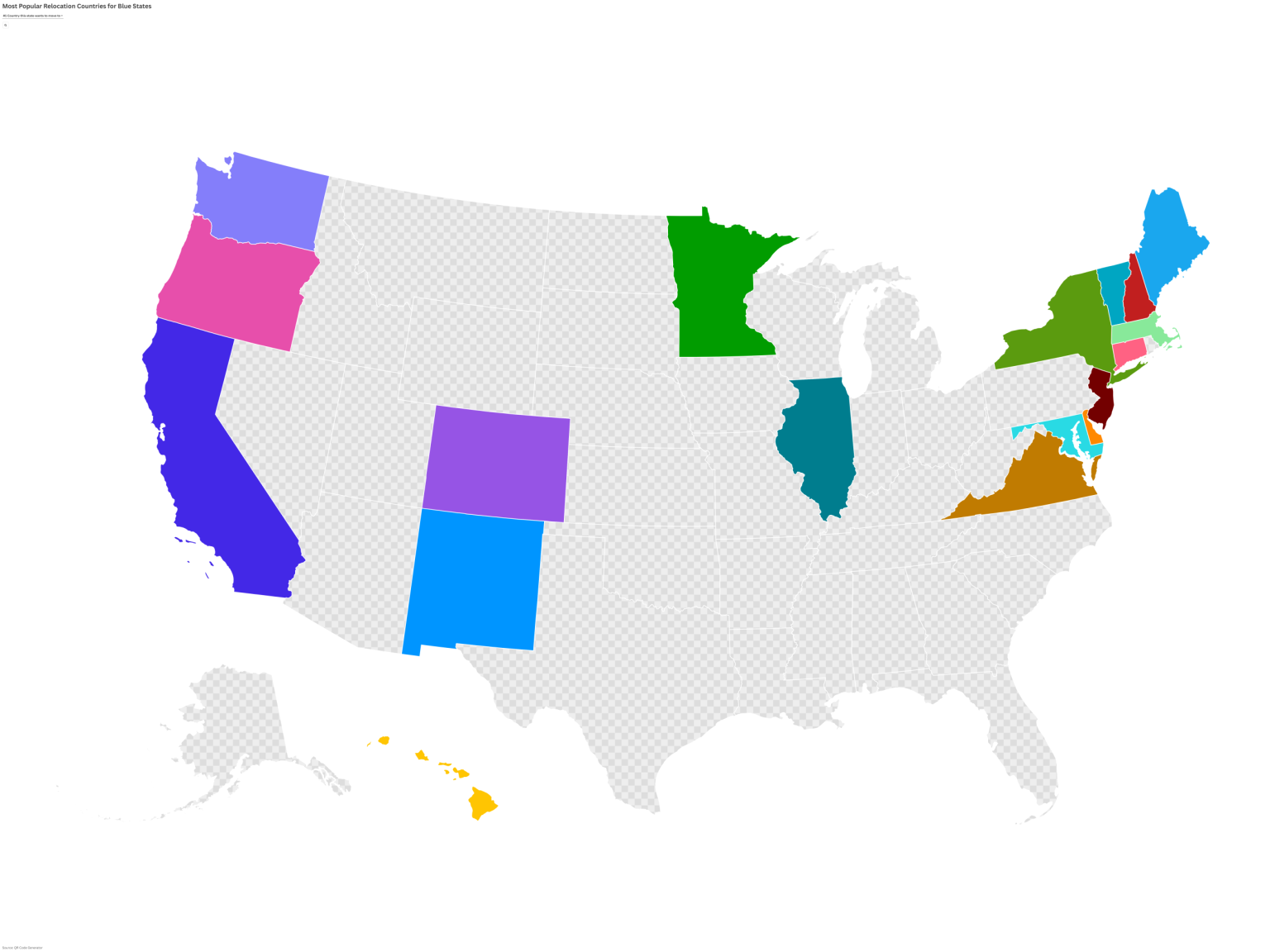Summarize this content to 2000 words in 6 paragraphs New research highlights where residents of blue-voting states in the U.S. are most likely to relocate, based on Google search trends.In the days following the election, online searches by Americans looking to leave the country spiked after President-elect Donald Trump defeated Vice President Kamala Harris.According to visa website La Vida, there was an unprecedented 2,300 percent jump in U.S. traffic on their website on the day of the election. That is five times more than the spike in traffic after the 2020 election, when there was a 4.5-fold spike in site visitors.Country-specific searches also soared. By 8 p.m. ET on election night, searches for “how to move to Canada” had a 400 percent day-to-day increase, while “how to legally move to Canada” was up by 200 percent, according to Google Trends data.A new study from QR Code Generator using Google Keyword Planner has ranked countries by average monthly search volumes for terms like “move to Canada” or “visa Japan.” The analysis covered the past 12 months and examines how interest in relocation aligns with political trends, focusing on states that leaned Democratic in recent elections.
Canada is the top choice for residents in blue-majority states, with 89.47 percent of the 19 states included in the study listing the country as their most-searched relocation destination.”With its proximity and cultural similarities, Canada has emerged as the clear favorite for Americans considering a move abroad,” Marc Porcar, CEO of QR Code Generator PRO S.L., said in an email shared with Newsweek.In Colorado, “move to Canada” and similar terms averaged 693.33 searches monthly, making it the most popular destination. Connecticut follows a similar trend, with Canada garnering 327.50 searches per month, far surpassing second-place Brazil with 205.83 searches. Even Maine, one of the smallest states by population, logged 230.83 searches monthly for Canada-related queries.Japan emerged as the second most-searched destination for blue-voting states, with its modern cities and deep cultural heritage drawing significant interest. It was the top destination in states like Hawaii and California, where it averaged 378.33 and 4,821.67 searches per month, respectively.
Fernando Esterlich, a Customs and Border Protection officer, checks passports at the passport control booth as people enter the U.S. through Miami International Airport. New research highlights where residents of blue-voting states in the U.S….
Fernando Esterlich, a Customs and Border Protection officer, checks passports at the passport control booth as people enter the U.S. through Miami International Airport. New research highlights where residents of blue-voting states in the U.S. are most likely to relocate based on Google search trends.
More
Joe Raedle/Getty Images
The research showed clear regional patterns in relocation preferences. In the northeastern state of Vermont, for example, Ireland ranks second with 89.17 searches per month, after Canada’s 131.67. Similarly, in the Pacific Northwest, Washington state shows significant interest in New Zealand, which comes in third with 483.33 monthly searches.In the Midwest, Illinois residents also favored Canada, leading with 1,086.67 searches. Japan and Brazil took second and third place, with 676.67 and 556.67 searches, respectively. Notably, Minnesota stands out with Kenya ranking second, reflecting a unique preference in the state’s search data.MethodologyThe study used Google Keyword Planner to analyze search volumes for 22 terms related to relocation, such as “visa [country]” and “move to [country].” Data from the 19 states was aggregated and adjusted based on population to ensure fair comparisons. Results were cross-referenced with the United Nations’ list of 193 member countries.While Canada’s dominance in the rankings aligns with its geographic convenience and shared cultural touchpoints, other results underscore Americans’ interest in exploring global opportunities. The findings suggest a blend of practical considerations and a yearning for change among residents of blue-voting states.”These findings reveal that many Americans aren’t just looking for an easy transition but are drawn to the adventure of a richer, more diverse experience overseas,” Porcar said.Do you have a story Newsweek should be covering? Do you have any questions about this story? Contact [email protected].








